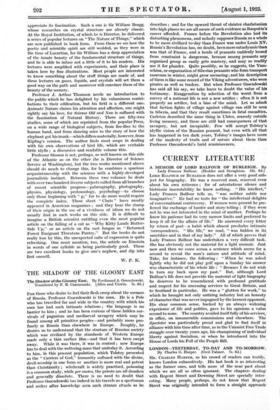THE SHADOW OF THE GLOOMY EAST
FOR those who desire to feel their flesh creep about the menace , of Russia, Professor Ossendowski is the man. .- He is a Pole : who has travelled far and wide in the country.with which his own has had such intimate relations ; :the language is no. barrier to him ; and he has been curious of those_ hidden sur- vivals of paganism and mediaeval savagery which may be found among all primitive peoples—and probably more pro- fusely m Russia than elsewhere .in Europe.. Roughly, he desires us to understand that the stratum of Russian society' which was civilized by _.the standards of . Western Europe Made only a thin surface film—and that it has been swept away. While it was there, it was in control ; now Europe has to deal with the weltering mass that underlay it. According to him, in this peasant population, which Tolstoy presented as the "Carriers of God," humanity suffused with the divine, devil-worship in one form or another is more real and potent than Christianity ; witchcraft is widely practised, poisoning is a common study, while per contra, the priests are all drunken and generally dissolute. There is no need to doubt that Professor Ossendowski has indeed in his travels as a sportsman and seeker after knowledge seen such strange rituals as he
describes ; and for the upward thrust of sinister charlatanism into high places we are all aware of such evidence as Rasputin's career afforded. France before the Revolution also had its disturbing phenomena, and nobody supposes Russia as a whole to be more civilized to-day than France was under Louis XV. Russia's Revolution has, no doubt, been more cataclysmic than was that of France, and a horde of peasants suddenly loosed from constraint is dangerous, because among peasants any organized group so easily gets mastery, and may so readily use it for plunder. Quite possibly, as he suggests, the Yam- schina, or organization of Siberian peasants who form transport caravans in winter, might grow menacing ; and his description of them is like some record of the Viking adventurers, who were pirates as well as traders. But when Professor Ossendowski has said all his say, we take leave to doubt the value of his testimony. Exaggeration by selection of the worst from a survey of a national life is not a new artifice : often it is not properly an artifice, but a bias of the mind. Let us admit that faction fights of village against village can still be seen In Siberia, and that they result sometimes in fatal casualties. Carleton described the same thing in Ulster, scarcely outside living memory, and there are still bad consequences of that savagery, but not inexpiable. Few will accept Tolstoy's idyllic vision of the Russian peasant, but even with all that has happened in ten dark years, Tolstoy's images have more of the modesty of truth and of nature about them than Professor Ossendowski's lurid reminiscences.






































 Previous page
Previous page